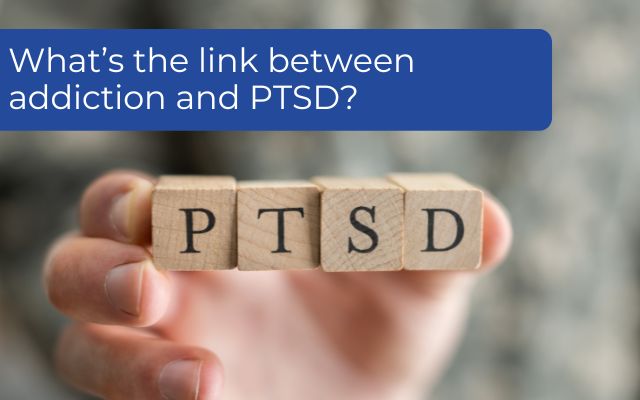
PTSD Increases Risk of Alcohol and Drug Dependence
Could your past trauma be increasing the risk that alcohol or drugs become a harmful way of coping?
Trauma, and more specifically, PTSD and addiction are linked in a number of ways. A PTSD diagnosis places a person at a high risk of developing a problematic relationship between drugs or alcohol. Read on for an in-depth look into the link between these two mental health conditions – backed by scientific research.
The link between mental illness and addiction goes both ways. About 50% of people with a severe mental illness are also affected by a substance problem. Moreover, roughly 37% of alcohol abusers and 53% of drug abusers have at least one other serious mental illness.
Although statistics for South Africa are not available, in the United States it is estimated that 69% of all the nation’s alcohol and 84% of all the cocaine used in that country is consumed by people who have been diagnosed with another mental illness at some point in their lifetime.
When another mental illness occurs alongside addiction it is termed dual diagnosis.

What is PTSD?
Post-traumatic stress disorder (PTSD) is a mental illness triggered by a traumatic event or events. It can be caused by both directly experiencing a trauma or being a witness to one.
Common symptoms include:
- Flashbacks: Reliving the traumatic event
- Recurrent, unwanted and distressing memories of the trauma
- Nightmares
- Severe anxiety
- Panic attacks
- Uncontrollable thoughts about the traumatic event
- Emotional or physical reactions to something that reminds the individual of the traumatic event
- Avoiding thinking or talking about the trauma and avoiding activities or people that remind the individual of the event
- Negative changes in thinking and mood such as hopelessness, feeling numb, feelings of guilt or shame, suicidal thoughts and difficulty experiencing positive emotions
- Difficulty maintaining close relationships
- Being easily startled
- Constantly being on guard for danger
- Trouble sleeping, concentrating or with memory
- Irritability or angry outbursts
- Self-destructive behaviour such as driving too fast or abusing drugs and alcohol
After a traumatic experience, most people struggle to cope temporarily. If an individual’s symptoms don’t resolve after several weeks, get worse, last for months or years and interfere with daily functioning, it is likely that they have PTSD.










The science behind the link between PTSD and addiction
Research has found that childhood trauma affects brain development and predisposes individuals to developing other psychiatric illnesses including addiction.
The link between trauma and substance abuse problems is strong and well-established. In fact, most people struggling with addiction have a history of trauma.
Surveys conducted in the United States have estimated that 70% of adolescents being treated for substance use disorders have a history of trauma.
In a 1997 study conducted on adolescents who were dependent on alcohol or drugs, 30% met the diagnostic criteria for PTSD at some point in their lifetime. More women (45%) than men (12%) were found to be suffering from PTSD.
However, other estimates suggest an even higher rate of co-occurrence of addiction and PTSD. For example, research has estimated that up to half of people seeking addiction treatment are currently suffering from PTSD.
According to a 2010 study, almost 60% of young people with PTSD go on to develop substance abuse problems.
It is thought that people turn to substances in an effort to delf-medicate symptoms of PTSD. Such individuals may need to use more and more of the substance to experience temporary relief: This cycle often leads to the development of an addiction. Although substance use helps people with PTSD in the short term, abusing substances usually ends up making PTSD symptoms worse in the long term.
Trauma in the South African context
South Africa has comparatively high rates of trauma and PTSD which is a significant driver of the country’s addiction epidemic.
A nationally representative survey found that 75% of South Africans had experienced a traumatic event and about half had experienced more than one trauma.
The country has high rates of criminal violence, domestic abuse and accidental injury.
These high rates mean that addressing trauma is very important when looking at addiction in the country. Substance abuse treatment in South Africa should be particularly sensitive with regards to identifying and treating clients with PTSD.
Treating PTSD and addiction
PTSD is common amongst people being treated for addiction and should, therefore, be high on the agenda of rehabilitation centres.
Individuals with co-occurring PTSD also tend to do worse in addiction treatment than those without the disorder. For example, people with PTSD receiving treatment for addiction have reported more intense drug cravings and tend to relapse more quickly than those without PTSD.
This is why it’s important for both the PTSD and the addiction to be treated simultaneously, with the help of experienced professionals including psychiatrists and psychologists.
An experienced psychiatrist should be able to properly diagnose PTSD, offering any suitable medicine-based treatments, while a psychologist will be able to help the client through a range of therapeutic approaches.
Therapies that have been successful in treating PTSD in addicts and alcoholics include cognitive behavioural therapy, prolonged exposure therapy and cognitive processing therapy.
A new and revolutionary therapy for treating trauma is called Brain Working Recursive Therapy (BWRT).
BWRT is an innovative type of psychotherapy that has been shown to reduce the symptoms of negative emotions. It is especially helpful for people who have experienced trauma or for people with anxiety, fears and phobias. BWRT shows results quickly, often after only a single session.
In January 2020 Changes became the first addiction treatment facility in South Africa to routinely provide BWRT to its clients, in response to the high rates of trauma and PTSD noticed amongst its patients.
In this blog we have described the complicated link between trauma, PTSD and addiction. We’ve also outlined the need to treat PTSD and addiction simultaneously with a brief description of the best therapies that should be used for this purpose.
Are you looking for addiction treatment experienced in addressing dual-diagnosis clients as well as people with PTSD though multiple techniques including BWRT? Contact us today.
PTSD and addiction often co occur when unresolved trauma pushes them towards alcohol and drug dependence, increasing risks and complicating long term recovery.. Changes team counsellors are here to help you.PTSD And Addiction Link Could Be Fuelling Substance Harm








